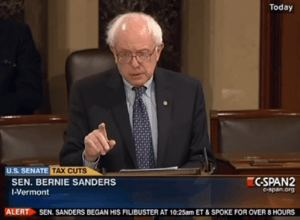Filibuster facts for kids
A filibuster, sometimes called talking out a bill, is a special way to delay or stop a vote on a new law or idea. It's a tactic used in government meetings, like in a country's parliament or senate. A person or a group can use it to prevent a decision from being made right away.
Contents
What is a Filibuster?
A filibuster usually involves a long speech or a series of speeches. The goal is to use up so much time that the meeting runs out of time to vote. This can force leaders to drop the idea or change it. It's like talking non-stop to prevent others from doing something you don't agree with.
History of the Filibuster
The word "filibuster" comes from a French word, "flibustier," which means "pirate." It was first used in the 1800s to describe this political tactic. However, the idea of using long speeches to delay decisions is much older.
Early Examples of Delay Tactics
Even in ancient times, people used similar methods. For example, in the Roman Senate, a famous leader named Cato the Younger used long speeches. He did this to try and stop Julius Caesar from gaining too much power. This shows that the idea of delaying votes has been around for a very long time.
Key Moments in Filibuster History
Filibusters have been used in many countries. Here are some important times this tactic was used:
- 1841: The first very long filibuster in the United States Senate happened. It lasted for many days.
- 1853: The word "filibuster" was officially written down for the first time in the US government's records.
- 1874: In the United Kingdom, a politician named Joseph Gillis Biggar gave very long speeches. He did this to delay laws that affected Ireland.
- 1880: Another Irish politician, Charles Stewart Parnell, used long speeches in the UK. His actions helped bring the issue of Irish self-government to the attention of Parliament.
- 1917: The US Senate created a new rule called "cloture." This rule allows a special vote to end a filibuster.
- 1919: A filibuster in the US Senate stopped a vote on the Treaty of Versailles. This treaty was important after World War I.
- 1957: US Senator Strom Thurmond gave the longest speech in Senate history. He spoke for over 24 hours to oppose a civil rights bill.
- 1964: The important Civil Rights Act of 1964 was finally passed. It happened after an 83-day filibuster in the US Senate was overcome.
- 1983: In Britain, John Golding, a Member of Parliament, spoke for over 11 hours. He was trying to delay a bill about telecommunications.
- 2011: In Canada, the New Democratic Party used a filibuster. They spoke for several days in the House of Commons of Canada about Canada Post.
- 2013: A vote to end a filibuster failed for Chuck Hagel. He was nominated to be the president's defense secretary.
See also
 In Spanish: Filibusterismo para niños
In Spanish: Filibusterismo para niños
 | Janet Taylor Pickett |
 | Synthia Saint James |
 | Howardena Pindell |
 | Faith Ringgold |


